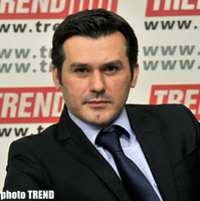ID :
220212
Wed, 12/21/2011 - 14:29
Auther :
Shortlink :
http://m.oananews.org//node/220212
The shortlink copeid
Turkey loses Iraq

Rufiz Hafizoglu, head of the Arab News Service Trend
The issue of which country and political power will fill the political vacuum that emerged after the fall of Saddam Hussein is on the agenda after the withdrawal of U.S. troops from Iraq.
The long period of instability, ethnic and religious diversity and the fact that the central government of Iraq is not strong, suggests that today's political elite will not be able to fill that void quickly. Even Iraqi officials don't exclude the possibility of civil war after the withdrawal of U.S. troops from the country.
The head of the Kurdish administration in northern Iraq Masoud Barzani in the interview with television channel Al Arabiya in October said that he opposes the withdrawal of U.S. troops from the country
"There is a serious need for the U.S.army in Iraq at the moment. The army of Iraq can't provide stability in the country and protect its borders and the country's air force has no power at all," Mr Barzani said.
He went on to say that he does not want the withdrawal of U.S. troops from Iraq, as this would create political vacuum crises in the country. Ethnic and religious problems will intensify and promote civil war in the country. Mr Barzani added the Kurdish administration can play an important role in preventing a possible civil war.
Naturally, the interests of neighbouring countries collide, along with the interests of Iraq, including Iran, Turkey and Saudi Arabia.
It is interesting that officials in Saudi Arabia said that it will send its troops into the country which was once considered a buffer zone with Iran, to protect the Sunni population after the withdrawal of U.S. troops from Iraq.
However, taking into account the real situation in Iraq and the pro-Iranian orientation of the Saudi government, it will not readily take this step.
It is possible that after the withdrawal of U.S. troops from Iraq, Ankara, which is perceived in the region as a real force will fill the political void. Some analysts even noted that there has been discussion on this very issue during the visit of U.S. Secretary of Defence Leon Panetta to Turkey.
Ankara has the potential to resolve many problems in the region. However it will not be able to fill the void in Iraq despite their efforts, taking into account the peculiarity of the country and the presence of the Kurdish administration with an independent military and administrative area, as well as the existence of problems with the KWP.
In short, after the withdrawal of U.S. troops from Iraq, a political vacuum in the country won't be filled by Saudi Arabia or Turkey, but by the Kurdish administration and the political elite, which is allegedly under the influence of Iran.
One of the most significant events that occurred in Iraq after the withdrawal of U.S. troops was a warrant for the arrest of a friend of Turkey and the enemy of an independent Kurdish state in the region, Vice President Tariq al-Hashimi.
It is assumed that the removal of Sunni al-Hashimi from the political arena on charges of supporting terrorist acts is a step aimed at reducing the influence of Ankara in Baghdad. After all, even the Iraqi Prime Minister Nuri al-Maliki in an interview with the Wall Street Journal on December 12 pointed out that Turkey was interfering in Iraq's internal affairs by supporting certain politicians and groups.
Time will tell in what direction events will unfold in Iraq, literally torn from the influence of Turkey and where religious and ethnic factors are considerable.





